

579.full.pdf. Positive Psychology Center. Positive psychology. To Martin Seligman, psychology (particularly its positive branch) can investigate and promote realistic ways of fostering more joy in individuals and communities.
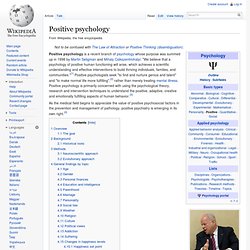
Positive psychology is a recent branch of psychology whose purpose was summed up in 1998 by Martin Seligman and Mihaly Csikszentmihalyi: "We believe that a psychology of positive human functioning will arise, which achieves a scientific understanding and effective interventions to build thriving individuals, families, and communities. "[1] Positive psychologists seek "to find and nurture genius and talent" and "to make normal life more fulfilling",[2] rather than merely treating mental illness. Positive psychology is primarily concerned with using the psychological theory, research and intervention techniques to understand the positive, adaptive, creative and emotionally fulfilling aspects of human behavior.[3] Overview[edit] Research from this branch of psychology has seen various practical applications.
The goal[edit] Fundamentals of Neuroscience - Wikiversity. Etymology of Neuroscience Terms. Clinical Depression Learning Path. "I can say without exception that this is the best article I have EVER read about depression and how to beat it.
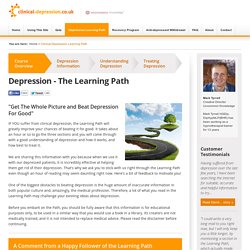
And I have read many, having been a depressive for over 40 years! " "I sincerely wish that more people could be made aware of your site, by some kind of publicity - be it more links from more sites or something. Because I strongly believe that they too would be helped by following the Learning Path and would then have the knowledge required on how to get help with beating their terrible depression.
" "So I implore you to publicise your site far more, so that it reaches far more people, because I think it's the most easy to follow, practical guide to beating depression I have ever read. " "I would like to thank everyone who contributed to your site and hope that millions of people will get to hear of it and be helped by it - which they would be, if they only knew it was there! " CNS Spectrums: The Future of Depression Psychopharmacology.
CNS Spectr. 2008;13(8):682-687 Dr.
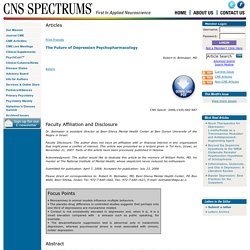
Belmaker is assistant director at Beer-Sheva Mental Health Center at Ben Gurion University of the Negev in Israel. Faculty Disclosure: The author does not have an affiliation with or financial interest in any organization that might pose a conflict of interest. This article was presented as a lecture given in Tel Aviv, Israel, on November 21, 2007.
Parts of this article have been previously published in Hebrew. Acknowledgment: The author would like to dedicate this article to the memory of William Pollin, MD, his mentor at The National Institute of Mental Health, whose skepticism never reduced his enthusiasm. Submitted for publication: April 7, 2008; Accepted for publication: July 23, 2008. Please direct all correspondence to: Robert H. Essential Facts about Hearing Voices. Advances in Psychiatric Treatment - Table of Contents — September 2013, 19 (5) Psychosomatica. Society for Humanistic Psychology (Division 32) President Brent Robbins, PhD Brent Dean Robbins, PhD, is director of the psychology program and associate professor of psychology at Point Park University in Pittsburgh, Pa.
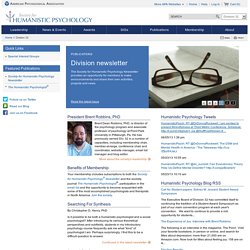
He has previously served Div. 32 in a number of capacities, including membership chair, member-at-large, conference chair and coordinator, website manager, email list manager and blog editor. Benefits of Membership Your membership includes subscriptions to both the Society for Humanistic Psychology® Newsletter and the sociiety journal The Humanistic Psychologist®, participation in the email list and the opportunity to become acquainted with some of the most accomplished psychologists and therapists in North America. Join the society. Searching For Synthesis By Christopher D. Is it possible to be both a humanistic psychologist and a social psychologist? Annual Conference President Brent Robbins, PhD Benefits of Membership Searching For Synthesis By Christopher D.
Annual Conference. Positive Psychology Center. Authentic Happiness. Division 17 Section on Positive Psychology. Reversal Theory Society. Welcome to the Reversal Theory website, a resource for researchers, practitioners, and students interested in the ideas and tools of Reversal Theory.
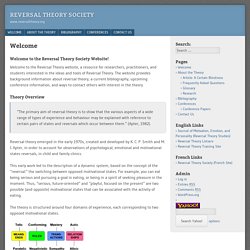
The website provides background information about reversal theory, a current bibliography, upcoming conference information, and ways to contact others with interest in the theory. Theory Overview “The primary aim of reversal theory is to show that the various aspects of a wide range of types of experience and behaviour may be explained with reference to certain pairs of states and reversals which occur between them.” (Apter, 1982). Reversal theory emerged in the early 1970s, created and developed by K. This early work led to the description of a dynamic system, based on the concept of the “reversal:” the switching between opposed motivational states. The theory is structured around four domains of experience, each corresponding to two opposed motivational states. Just getting started? Accelerated Experiential Dynamic Psychotherapy - AEDP Institute. TACSEI. ERP_38-2_Stampfer-H.-2011.-The-recruitment-problem-in-psychiatry.pdf.